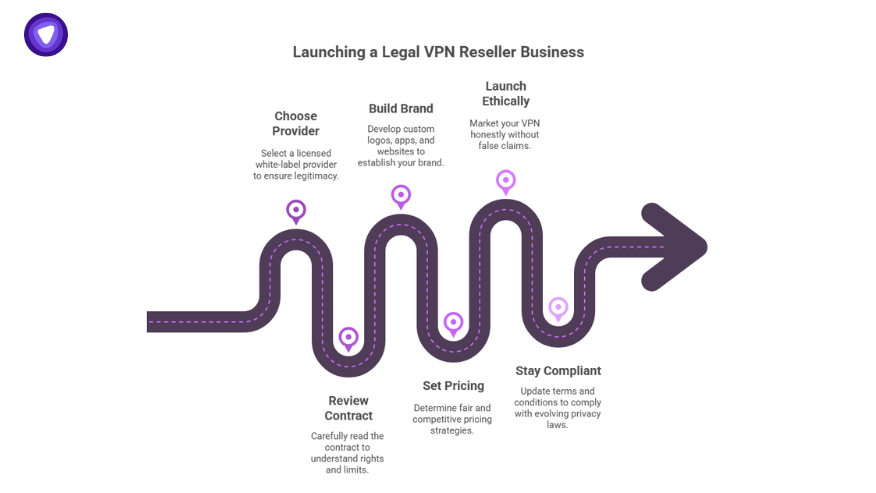Is Reselling Legal if You’re White-Labeling VPN Services?
“Is reselling legal?” It’s one of the first things people search before they flip shoes, dropship gadgets, or launch a white-label SaaS.
In most places, like the USA, Canada, and the EU, you can legally resell goods you bought lawfully. It’s the same reason thrift shops, Amazon FBA sellers, or retail stores exist.
But digital services — like white-label VPNs — aren’t physical inventory. That’s where it changes. You’re licensing a service, not just moving boxes.
What Does “White-Labeling” a VPN Service Mean?
A white-label VPN means you sell an existing, proven VPN network under your own brand. You don’t build the servers or run the data centers — you license the backend from a provider like PureVPN.
Key difference: You control the customer-facing brand, pricing, and marketing. The provider manages the infrastructure.
Affiliate vs White Label: Affiliates just earn a commission for each sale under the leading brand. A white-label VPN means your customers see your logo, your support team, and your billing portal.
White-Label vs Affiliate: What’s Best?
How you earn: You get a commission on each sale.
Who owns the brand: The main brand (PureVPN) stays front & center.
Legal/contract need: Basic affiliate agreement, payouts based on tracked conversions.
Why it works:
- Launch fast
- Avoid huge development costs
- Scale fast with recurring subscriptions
- Your provider handles the tech and legal privacy frameworks
How the Law Sees Reselling (Basics)
Is Your Resell Idea Legal?
The First Sale Doctrine
The First Sale Doctrine is the foundation for reselling physical products in the US and many other regions. Once you lawfully buy a physical item, you have the right to resell it. You don’t need the original manufacturer’s permission.
Example: Is it legal to resell Temu products? If you legally purchased those items, yes, you can flip them on eBay, at a flea market, or in your own store. That’s why so many resellers start by moving cheap electronics, clothes, or drop-shipped gadgets.
The catch? The item must be authentic. Is reselling reps legal? No. Selling knock-offs violates trademark law, and you could be sued for fraud.
What About Digital Goods?
Digital goods, software, e-books, music downloads, VPN subscriptions — don’t come with First Sale rights. They come with licenses. When you “buy” a VPN, you’re paying for access under specific terms. You can’t just buy one subscription and sell logins to everyone in your WhatsApp group.
So, is it legal to resell items for a higher price? For physical goods, yes, markup is perfectly legal as long as you’re honest about what you’re selling and not price-gouging in an emergency. But for digital goods, it depends on the license. Most software EULAs specifically forbid unauthorized reselling.
This is where white-label agreements come in. A proper white-label VPN setup gives you written permission to repackage and resell the service, legally. Skip the contract, and you’re crossing a line.
How Does White-Label VPN Reselling Actually Work?
A white-label VPN setup means:
- You don’t build the tech yourself.
- A bigger provider, like PureVPN, handles servers, encryption, updates.
- You sell it under your own brand and price point.
You get a license to use their infrastructure. That’s why it’s legal — you’re not pirating. You’re paying for the right to resell.
This is why, if you’ve ever asked, ‘Is it legal to resell items?’ the answer is: yes, with digital products, only if the vendor’s terms allow it.
Where You Need to Be Careful?
Restricted Markets: VPN Usage Status
-
 China
Blocked/Restricted
China
Blocked/Restricted
-
 Russia
Blocked/Restricted
Russia
Blocked/Restricted
-
 UAE
Partially Restricted
UAE
Partially Restricted
-
 Iran
Blocked/Restricted
Iran
Blocked/Restricted
-
 India
Partial Data Retention
India
Partial Data Retention
It’s not just about “Is reselling legal?” It’s about where you’re selling and what you’re selling:
- Allowed: USA, Canada, EU, most of Asia.
- Restricted: China, Russia, UAE, Iran — these countries limit or ban VPN services.
- Why? Local laws around privacy, data control, or censorship.
Trying to white-label a VPN in these restricted markets could land you fines — or worse. Always check local laws.
Legal Considerations for White-Label VPN Reselling
Before you launch:
- Verify your provider’s legal standing. Do they comply with local privacy laws?
- Sign a solid reseller agreement. Know exactly what you can and can’t do.
- Check local laws. VPN resale is banned or restricted in some countries — be aware.
- Publish clear Terms of Service. Stay transparent with users.
- Pay your taxes. Many new resellers miss this part.
What If I Do It Wrong?
See what ignoring licensing could really cost you — choose your product type below.
Steps to Start a Legal White-Label VPN Reseller Business

- Pick a licensed white-label provider. Don’t risk shady knockoffs.
- Read the contract carefully. Know your rights and limits.
- Build your brand assets. Custom logo, apps, website.
- Set your pricing. Stay fair and competitive.
- Launch ethically. Market your VPN honestly — no false claims.
- Stay compliant. Update T&Cs as privacy laws evolve.
Stay Connected & Learn With Us
Join our growing community and connect with peers who build secure networks and resell privacy tools worldwide.
Conclusion
So, is reselling legal if you’re white-labeling VPN services? Absolutely — when you do it right. Stay away from shady shortcuts. Partner with a licensed, reputable white-label VPN provider like PureVPN. Keep your resale agreement tight, your taxes in order, and your branding clear. Done well, a white-label VPN can be one of the smartest, simplest ways to earn recurring revenue in the booming privacy market.


